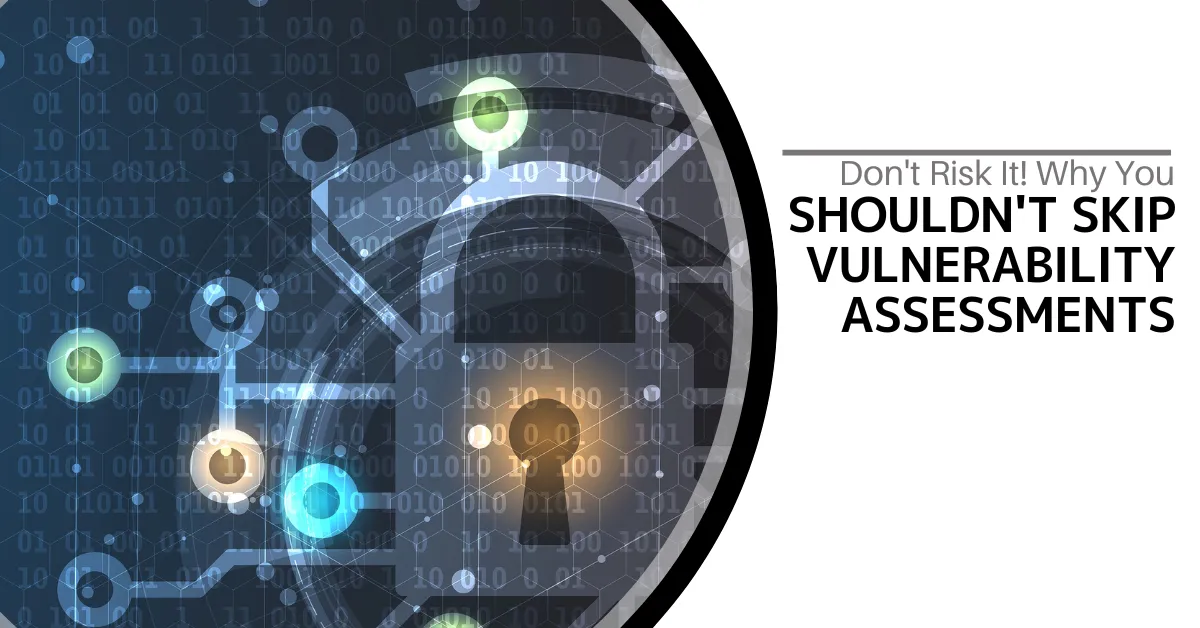See Our Latest Blogs
Stay updated with the latest trends and insights in Information Technology, cybersecurity, and digital transformation. Explore expert advice, practical tips, and innovative solutions to enhance your business efficiency and security on the CMIT Solutions blog

Don't Risk It! Why You Shouldn't Skip Vulnerability Assessments
Cyber threats are relentless. Hackers are always looking for new ways to exploit your systems. For every business, big or small, staying ahead of these threats is crucial. Regular vulnerability assessments are a key part of this defense.
A vulnerability assessment systematically finds and prioritizes weaknesses in your IT setup that hackers can exploit. Some might think it’s too expensive or just for big companies, but that’s a dangerous myth. Skipping these assessments can cost you dearly.
In 2023 alone, over 29,000 new IT vulnerabilities were discovered, the highest count reported to date (Cybersecurity Ventures, 2023).
Why Vulnerability Assessments Matter
Cybercriminals are on the prowl, looking for weaknesses to exploit. They aim to:
Steal sensitive data
Launch ransomware attacks
Disrupt operations
Vulnerability assessments are crucial because:
Unseen Weaknesses: Many vulnerabilities are hidden deep within your IT environment. Regular assessments uncover these weak spots before hackers can exploit them. For example, hidden configuration issues or outdated software versions that could be exploited by cybercriminals are often only found through these assessments (SANS Institute, 2022).
Evolving Threats: New vulnerabilities are found all the time. Regular assessments ensure your systems are up-to-date and secure. With cyber threats evolving constantly, what was safe yesterday might not be safe today. Regular assessments keep your defenses current (Gartner, 2023).
Compliance Requirements: Many industries require regular vulnerability assessments to meet data security and privacy regulations. For instance, healthcare organizations must comply with HIPAA, which mandates regular risk assessments (HHS.gov, 2023).
Proactive vs. Reactive: Identifying vulnerabilities proactively allows for timely fixes, reducing the risk of costly breaches. Reacting only after an attack can lead to massive financial losses and business disruptions. The Ponemon Institute reports that businesses with a proactive security approach spend significantly less on breach recovery (Ponemon Institute, 2023).
The High Cost of Skipping Vulnerability Assessments
Skipping assessments might seem like a way to save money, but the costs of neglecting them are much higher. Here’s what you risk:
Data Breaches
Leaving vulnerabilities unchecked makes your systems easy targets. One breach can result in the theft of sensitive data and customer information. IBM's Cost of a Data Breach Report 2023 states that the average data breach costs businesses $4.45 million (IBM, 2023).
Financial Losses
Breaches lead to fines, legal costs, and expensive recovery efforts. Business disruptions from attacks also mean lost revenue and productivity. The current average cost of a data breach has increased by 15% over the last three years, illustrating the growing financial impact of cyberattacks (Verizon Data Breach Investigations Report, 2023).
Reputational Damage
A breach can tarnish your company’s reputation, eroding customer trust and hurting future business prospects. A study by PwC found that 87% of consumers will take their business elsewhere if they don’t trust a company to handle their data responsibly (PwC, 2023).
Loss of Competitive Advantage
Cyberattacks can cripple your ability to innovate and compete. Instead of focusing on growth, you'll be stuck dealing with security issues. Companies that suffer from significant breaches often lose market share to competitors who are perceived as more secure (Forrester Research, 2023).
The Benefits of Regular Vulnerability Assessments
Regular assessments bring numerous benefits:
Improved Security Posture: Identifying and fixing vulnerabilities reduces your risk of attack. The Cybersecurity & Infrastructure Security Agency (CISA) recommends regular assessments as a foundational security practice (CISA, 2023).
Enhanced Compliance: Stay compliant with industry regulations and data privacy laws. Regular assessments help you avoid hefty fines and sanctions by ensuring you meet standards like GDPR, HIPAA, and PCI-DSS (ISACA, 2023).
Peace of Mind: Knowing your network is secure lets you focus on your core business. Business leaders can operate with confidence, knowing their IT infrastructure is protected against known vulnerabilities (NIST, 2023).
Reduced Risk of Costly Breaches: Proactive management prevents expensive breaches and their financial fallout. Studies show that proactive security measures reduce breach costs by an average of 27% (Accenture Security, 2023).
Improved Decision-Making: Assessments provide insights into your security, helping you make better decisions about security investments and resource allocation. Detailed reports from assessments guide IT strategy and budgeting (Gartner, 2023).
The Vulnerability Assessment Process: What to Expect
A vulnerability assessment includes:
Planning and Scoping: Define the scope, identifying which systems and applications to evaluate. This initial phase ensures that all critical assets are covered and sets clear objectives for the assessment (SANS Institute, 2023).
Discovery and Identification: Use specialized tools to scan your IT infrastructure for known vulnerabilities. Tools like Nessus or OpenVAS can identify thousands of potential issues, from unpatched software to misconfigurations (Qualys, 2023).
Prioritization and Risk Assessment: Classify vulnerabilities by severity and impact, focusing on critical ones. Not all vulnerabilities pose the same risk; prioritization helps allocate resources effectively to address the most dangerous flaws first (MITRE, 2023).
Remediation and Reporting: Develop a plan to fix vulnerabilities, including patching and configuration changes. Provide a detailed report on vulnerabilities found, their risks, and remediation steps. Continuous monitoring and reassessment ensure that vulnerabilities remain addressed and that new ones are promptly managed (CIS, 2023).
Investing in Security is Investing in Your Future
Vulnerability assessments aren’t a one-time fix. Conduct them regularly to maintain strong cybersecurity. By finding and addressing vulnerabilities, you can:
Reduce your risk of cyberattacks
Protect sensitive data
Ensure business continuity
Cybersecurity is a continuous process. Vulnerability assessments are a critical tool in your defense strategy. Don’t risk your business’s future. Invest in regular assessments to protect your valuable assets.
Contact Us Today to Schedule a Vulnerability Assessment
When was your last vulnerability assessment? Regardless of your business size, we can help. Our assessments identify weaknesses in your infrastructure and provide actionable recommendations. Schedule your vulnerability assessment today for better security.
Sources:
"CMIT has given me peace of mind in my business by providing me with ongoing protection, monitoring and an invaluable resource of providing technical help 24/7 if needed. They have assisted me with various technical needs in my business and I appreciate small businesses supporting other small businesses in our community."
Swiss Learning Center
"CMIT sent Leslie out to deal with my computer issue - which she handled so fast I can't remember now what it was! Leslie was patient, informative, and engaged me with confidence and relief. She did not talk down to me as if I didn't have a modicum of sense - electronically - but instead was in a teaching mode. I'm so glad to know I can call CMIT whenever I have a problem and allay my fear!"
Shari
"Every business NEEDS Carmen and Jaime with CMIT Solutions. They have taken my business to the next level and I am so grateful to have them on our team. It's like having our own personal IT department. We are more productive, more professional, and ready to worry about things other than IT. As a construction company - it is not in our wheelhouse to manage this side of the business and as a small business it's not super easy to know who to contact. They are affordable and knowledgeable and can easily take any business to where they envision. They come with my highest recommendation."
Ashley R.
Get In Touch
Email: [email protected]
Address
Office: 4514 Cole Ave # 600, Dallas, TX 75205
Assistance Hours
Mon – Fri 8:00am – 5:00pm
Sat-Sun – CLOSED
Phone Number:
NOT JUST IT. COMPLETELY MANAGED IT.
Complete IT solutions the moment you need them.
© 2025 CMIT Solutions of Dallas - All Rights Reserved,


